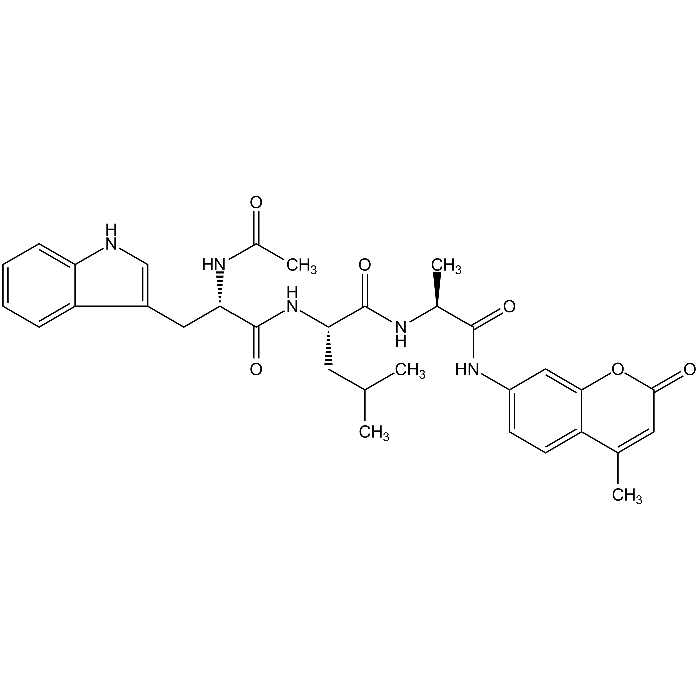Cookie Policy: This site uses cookies to improve your experience. You can find out more about our use of cookies in our Privacy Policy. By continuing to browse this site you agree to our use of cookies.
SouthBayBio
Ac-Trp-Leu-Ala-AMC [Ac-WLA-AMC]

| Product Details | |
|---|---|
| Synonyms | Proteasome Substrate |
| Product Type | Chemical |
| Properties | |
| Formula |
C32H37N5O6 |
| MW | 587.7 |
| Sequence |
Acetyl-Trp-Leu-Ala-7-amido-4-methylcoumarin |
| CAS | 1104011-59-7 |
| Purity Chemicals | ≥95% (HPLC) |
| Appearance | Lyophilized powder. |
| Solubility | Soluble in DMSO. |
| Declaration | Manufactured by South Bay Bio. |
| Other Product Data |
Use: After preparing a stock solution in DMSO (≥10mM) store product at -20°C to -80°C. It is recommended to make multiple aliquots after the first thaw to ensure best performance. Chymotrypsin-like activity can be measured using a typical working concentration range from 10-50µM. Click here for a Typical Lot-specific Product Datasheet from the Original Manufacturer |
| InChi Key | PIJMRHCPKXLMIS-DOYMOWJKSA-N |
| Shipping and Handling | |
| Shipping | BLUE ICE |
| Short Term Storage | +4°C |
| Long Term Storage | -20°C |
| Handling Advice |
Avoid freeze/thaw cycles. Protect from light. |
| Use/Stability | Stable for at least 1 year after receipt when stored at -20°C. |
| Documents | |
| Product Specification Sheet | |
| Datasheet |
 Download PDF Download PDF |
Ac-WLA-AMC is a fluorogenic peptid substrate for measuring chymotrypsin-like activity of the proteasome. Hydrolysis of this substrate by the β5-subunit of the 20S proteasome is monitored by observing fluorescence at an Excitation wavelength of 345nm and Emission at 445nm. This substrate is specific to the constitutive proteasome and is not hydrolyzed efficiently by the immunoproteasome. 20S Proteasome enzyme requires activation with 0.035% SDS in the assay buffer.
- Characterization of a new series of non-covalent proteasome inhibitors with exquisite potency and selectivity for the 20S β5-subunit: C. Blackburn, et al.; Biochem. J. 430, 461 (2010)
- The immunoproteasome as a therapeutic target for hematological malignancies: Z. Miller, et al.; Curr. Can. Drug Targets 14, 537 (2014)
- Immunoproteasome-selective inhibitors: a promising strategy to treat hematologic malignancies, autoimmune and inflammatory diseases: R. Ettari, et al.; Curr. Med. Chem. 23, 1217 (2016)
- Development of Potent and Highly Selective Epoxyketone-based Plasmodium Proteasome Inhibitors: J. Almaliti, et al.; Chemistry ahead of print (2023)










![Z-Leu-Leu-Nva-CHO [MG-115]](https://adipogen.com/media/catalog/product/cache/60eb5af712bc93baae8d55513bd31b01/a/g/ag-cp3-0015_mg-115.png)

